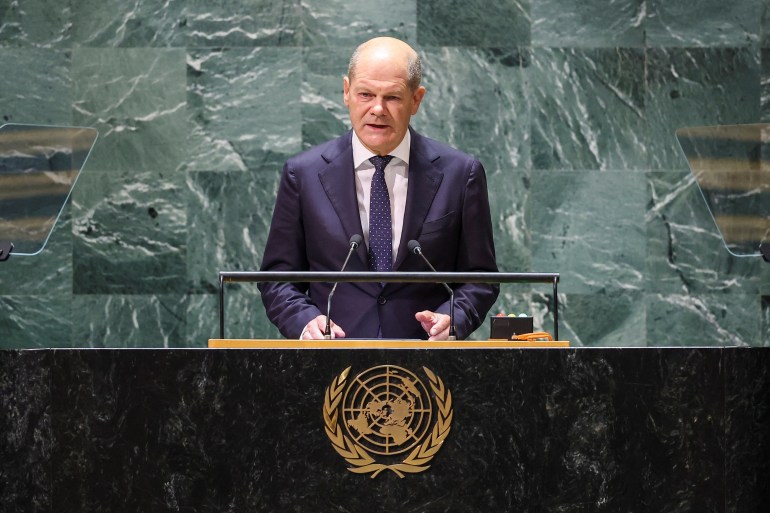German Chancellor Olaf Scholz began his speech by referring to the time when Germany was split between East and West, but both had joined the UN together, though as separate states, 50 years ago.
Germany’s history reminded that a policy of peace must not stop on one’s own doorstep, Scholz said, adding that Germany is aware that its current freedom, democracy and prosperity are “deeply rooted” in the wellbeing of Europe and the world.
More international cooperation is required in a multipolar world and the UN system is where that cooperation can be realised, he said.
“All of us. Almost all of us want force as a political instrument to remain banned,” Scholz said.
“All of us have an interest in ensuring that the sovereignty, territory integrity and political independence of our countries is respected, and all of us should know what this requires. Namely, that we also grant others these rights. These golden rules are universal,” he said.
Scholz then directed his words towards people suffering amid conflict from Africa to Ukraine.

“Russia’s war of aggression has caused immense suffering, not only in Ukraine. People around the world are suffering as a result of inflation, growing debts, the scarcity of fertiliser, hunger and increasing poverty,” he said.
Because the war in Ukraine had consequences for the wider world, it was “right and proper” that the world is involved in the quest for peace. But it had to be a real peace, the German chancellor said.
“Peace without freedom is called oppression. Peace without justice is called dictatorship. Moscow too must finally understand that,” he said.
Russia is responsible for the war in Ukraine and Russia’s President Vladimir Putin can “end it any time with one single order”.
There is no place for imperialism in the multipolar world of the 21st century, he added.
Germany and all UN members promised on joining the world body to “unite our strength to maintain international peace and security”, Scholz said.
“Let us all do our best to live up to that promise,” he said.
Climate change was also a great challenge to the world, Scholz said in his speech, and industrialised countries had a particular responsibility in the fight against the climate crisis.
“Instead of waiting for others, we all have to do more together to achieve the Paris climate goals,” he said, noting that the world economy could only continue to grow with new renewable energy technologies.
The German chancellor also said that he supported reform of the composition of the UN Security Council. Africa, Asia and Latin America deserved greater representation, he said.
This post was originally published on this site be sure to check out more of their content.








